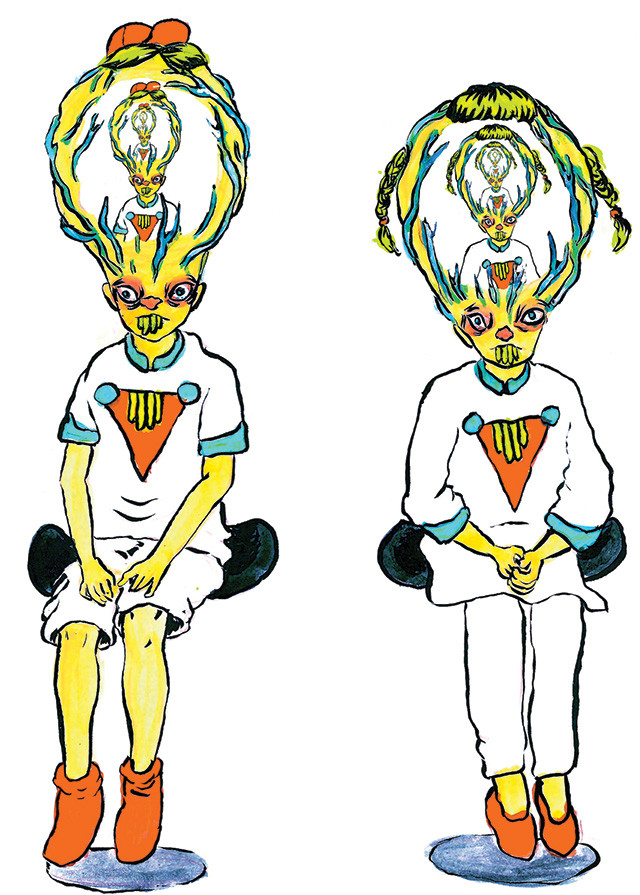
Illustration by Penelope Gazin
Futurism isn’t what it used to be. In late-1950s and early-60s U. S. of A., the sensibility was entirely optimistic. The reasonable adults who had infested city-adjacent farmland, creating car-contingent lifestyle paradigms, wondered when they’d be flying airplanes to work: this year, or the next. Those who had a pulse also had a job. Dreaminess about what would and could be was once collective and literate and transmitted through not only science fiction novels but also space comics starring Buck Rogers.
Videos by VICE
The way I see it, the type of boxed-in American Dream with Johnny Carson and social novels either fucking sucked or was so claustrophobically limited if you weren’t a straight white man, obviously. Everyone watched the same TV shows, read the same books, and shared in the same superficially positive narrative. Then, owing to various social fractures and the usual periodic recessions, all the way into the AIDS-y 80s and the carcinogenic burn of Wall Street money, that early optimism was reconfigured into an American psychosis of certain-death horror and terrified self-obsession.
None of that is, like, new. Since I’ve been conscious (’89? ’90? I remember the end of the Cold War, but only through the soft weave of a satin-edged blankie), the cultural consciousness has been hungover, or something, in dull shock that this is what’s real—that something was lost, reveling in repetition and postpunk and featureless Calvin Klein slip dresses and embarrassment about whatever, maybe the incipient sense that something, or everything, is over. (Which follows, logically—Buck Rogers giving way to Blade Runner.) Mid-90s Jonathan Franzen (that guy) wrote, “For every reader who dies today, a viewer is born, and we seem to be witnessing… the final tipping of a balance,” a phenomenon he characterized as “apocalyptic,” which, whatever. Reasonable adults expected, and continue to expect, nothing.
It can’t last forever and ever, though. In a post on his Gizmodo site in July, Gawker Media boss Nick Denton wrote, “We need to recapture some of the naïveté of the 19th century or the early space age.” Agreed. Somehow, our sense of wonderment has been corrupted by a social, cultural, and technological bathos, totally despite ourselves, despite the myriad capabilities of the internet (like, everything).
The recent past has been more infused with legit THE FUTURE!-ness than all of the technology of the previous 40 years, even if we stack up the stuff from those decades and bleed it for meaning. Somehow, the infinite potential of the internet’s wildness (and that of message boards and relational aesthetics and Facebook) mostly diverged into cruel, lonesome individuation.
Denton continued, “Even a call for naïveté seems itself naive in a cynical climate,” and cited the inescapably vapid nature of social networking; I’ll add that the larger impulse to “curate” one’s personal online experience—usually as a viewer, not a reader (sowwy, Franzen), and always as performance without participation—is mostly corrupt. Any idiosyncratic representation of online personhood could be called “good,” and it’s also “good” that the machinations of social media are handily alienating a super-bullshitty mainstream, but it all happens in a very banal, basic way. Ultimately, the primary way to use the internet is utterly impoverished. (There are undoubtedly pockets of nascent collectiveness, like meme-based internet aesthetics and, more recently, the related and hopeful retro-futurism showing in, say, Balenciaga’s new and very dope leather sweaters, fronted with sci-fi images, and spacesuit-y work wear.)
It’s hard to care about the world at large and its potential when you don’t have to, when there is no demand on the people who determine the future to be interested in it; it’s hard to feel or want to feel naive when the social emphasis is skeptical, ironic (STILL!), and turned inward, to the point where there is no—no!—common vision of the future.
“In the 50s, everyone thought everything was going to be great.” My dad said that. (He’s so old.) And yet the current keepers of the new, the possible, the internet, the historical figures of transformative youth chaos, have largely abstained from thinking about what everything is going to be like. And all this so we can look at things, alone. ’S boring. If we’re doing all of this to forge something for ourselves, so far we’re doing it wrong.
Previously — Witness the Whiteness
More
From VICE
-

-

Illustration by Reesa -

Illustration by Reesa.

